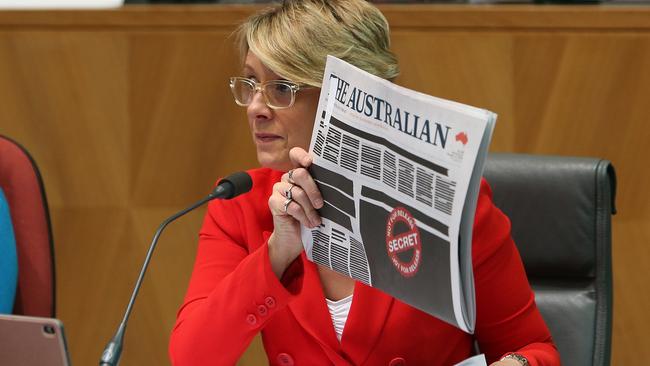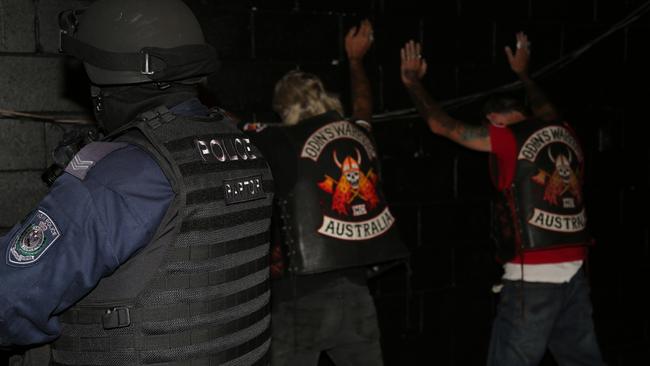Laws that are meant to protect journalists and whistleblowers are falling short
From assaults at aged care homes to gangs holding shopkeepers at ransom. You have a right to know which is why law needs to change.
A few years ago, it was revealed triads had conscripted Red Army soldiers from Beijing to move on Sydney’s Chinatown in a mass stand over and extortion racket suspected of being mirrored in Chinese communities in other capital cities in Australia.
Australian Federal Police (AFP) working with NSW counterparts reflected in their report on how it was affecting innocent Chinese shopkeepers and restaurateurs in a community already too scared to speak out.
It was an embarrassment that this was occurring with apparent multi-agency failures.
When the story appeared there was little comment from authorities but an internal police investigation was immediately launched into the leaking of the report with a police officer later told telephone calls had been tracked and it was noted he had spoken to this journalist the day before the story appeared.
It didn’t matter he was not even the source of the story, the distraught officer was advised his career progression was over.
This week an unprecedented coalition of media organisations came together to fight for the public’s right to know and more over, better protections for whistleblowers.
This is not just about the media wanting to enshrine press freedoms but rather a fight for the public’s right to know information that may well affect them or those they know.
From restricting publication about assaults at aged care units to details about criminals who have infiltrated the ranks of law enforcement including police and Australian Border Force, reporting has been stymied at an ever-increasing rate.
RELATED: Dutton faces secrecy investigation

The Australian Criminal Intelligence Commission (ACIC) issued a stunning Wastewater report this year as part of its series revealing what it described as an “alarming” rise in the use of ice and MDMA that was tearing apart generations of regional Australia.
All states were cited and what little detail was made available, should have been a wake-up call for local community and health services.
But ACIC have repeatedly refused to reveal the identity of the regional capitals or even the broad districts that were identified as being ravaged by the drugs and clearly already being targeted by crime groups, notably outlaw motorcycle gangs.
There was no clear reason why that information could not be made public other than that was the directive from the Home Affairs Department.
The ACIC has also turned down multiple requests for details about the growing community threat of crime, drugs and violence from gang members other than saying the threat was growing.
They hide behind legislation to tell the public where, why or how big in real terms the problem is.
The only hint for the public comes after a mass brawl, an execution-style murder or an arrest is made.

MORE NEWS
Chinese gang’s role in death truck tragedy
Hundreds of tourists rush to climb Uluru on last day
Tot caught up in shooting was on mum’s lap
Even this month state and federal governments were blocking the release of details about public buildings with flammable cladding that pose a significant public health risk, ministers claiming such information could encourage arson targets by criminals or terrorists.
The examples are endless, with the creeping secrecy emerging since 2001 and the 9/11 attacks and a push to view all public information release through the prism of a potential terror risk.
To support this case, at least 75 pieces of legislation have been passed some of which are now being used to stop the public’s right to know these issues that affect them.
The straw that broke the camel’s back on the issue were the AFP raids on the home of News Corp Australia political journalist Annika Smethurst and a day later on the ABC headquarters in Sydney.
Smethurst had written, ironically, about secret government plans to snoop further and the ABC on the Afghan files, a detailed report on alleged atrocities by Australian Special Forces soldiers in Afghanistan.
But in truth, blocks to the flow of critical information and police raids, at both state and federal level, to find media leaks have been carried out for years with little reporting as it is seen as an accepted part of the story.
But the secrecy laws are tightening further.
Former Herald Sun journalist Michael Harvey wrote a story that exposed government plans to deny benefits to war veterans and widows.
He was charged in 2005 with refusing to reveal the identity of the whistleblower and for that, he had faced years in jail before being convicted and fined.
“Situations like ours underline how the law must change to protect the public’s right to know,” Harvey said now.
“Democracy fails if news organisations report only what governments want them to report.”
As the media campaign for Australia’s Right to Know gained momentum this week, many in the public flagged the irony about the plight of Australian activist publisher Julian Assange being pursued over his interpretation of freedom of speech.
There is a chasm of difference between mainstream media’s bid to keep the public informed on critical matters and the irresponsible dumping of hundreds of thousands of classified cables and documents on the internet.
Major media organisations have a critical understanding of the importance and need of classified information to remain just that and there have been countless examples where such material comes to hand but is not published because of the broader dangers they pose.
It is a question of balance and responsibility and one that media organisations take seriously.
The Public Interest Disclosure Act purports to provide protections for whistleblowers and journalists but in reality falls well short on many levels.
That law must change to afford public servants with greater protections including expanding the public’s interest test that currently holds bias against external disclosure, a presumption of criminal liability against media for using the information and the government’s ability to identify sources via telephone tapping journalists’ communications and metadata.
Originally published as Laws that are meant to protect journalists and whistleblowers are falling short
